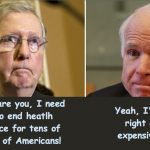health insurance
At Reveal, Amy Julia Harris and Shoshana Walter investigate an increasing criminal justice trend in which defendants are sent to rehab, instead of prison. On its face, the idea is a good one, especially for people struggling with addiction. However, the reporters find that many so-called rehab centers are little more than labor camps funneling unpaid workers into private industry.
The story focused on one particular center, Christian Alcoholics & Addicts in Recovery (CAAIR) in Oklahoma. Started by chicken company executives, CAAIR’s court-ordered residents work full-time at Simmons Foods…
In yet another attempt to repeal and replace the Affordable Care Act, much of the GOP justification boils down to one argument: that the ACA isn’t working. Never mind that we don’t really know what constitutes a “working” health care system for Republicans.
For a while, Republicans said the ACA wasn’t working because some U.S. counties didn’t have an insurer. Today, no county is without an insurer. Then there’s the argument that ACA premiums are too high. However, the research shows that while premiums have gone up, the rise in premiums has been slower under the ACA than it was before the ACA…
Senate Republicans are again trying to ram through an Affordable Care Act replacement that threatens the health and well-being of millions of Americans. It’s shameful. But don’t take my word for it. Let’s look at what people who actually work in health care are saying about the Graham-Cassidy-Heller-Johnson bill.
In this interview, Sen. Bill Cassidy insists that his bill would protect people with pre-existing conditions. Blue Cross Blue Shield Association disagrees. (Cassidy also says in that same interview that his bill would work through the Children’s Health Insurance Program (CHIP), which…
Earlier this week, members of the Senate Finance Committee announced an agreement to extend funding for the Children’s Health Insurance Program. The announcement had been anxiously awaited by families and advocates across the nation, as the program’s federal funding expires in about two weeks. The agreement is good news, but coverage for CHIP’s 8.9 million children isn’t safe just yet.
According to reports, the agreement would extend CHIP’s funding for five years — a win for advocates worried that lawmakers might propose another two-year extension as it did in 2015. The agreement would also…
The idea that the Affordable Care Act is a job killer is one of those regularly debunked talking points that won’t disappear. So, here’s yet more evidence that the ACA has had very little impact on the labor market.
In a new study from the National Bureau of Economic Research, a team of Stanford University economists found that even though different regions experienced varying labor market effects likely related to the ACA, the overall impact to jobs numbers was insignificant. In particular, researchers wrote: “Our findings indicate that the average labor supply effects of the ACA were close…
John McCain has a good heath care plan, and if has his way, you won't.
The Senator most often accredited for thinking for himself (that's a lie) will vote with Russian agent Donald Trump and the rest of the Republicans to take away Obama care. The moment he gets a chance.
However, he can't right now because he is indisposed, recovering form surgery.
We at Greg Laden's Blog wish Senator McCain a speedy recovery and hope he is well. But we also urge him to think about his privilege and not take access to the sort of health care he has from other Americans.
Speaking of the Russians, The Looking…
In Cuyahoga County, Ohio, nearly 200 people have died from opioid-related overdoses in the first five months of this year. That means that this one U.S. county is on pace to lose more than 700 people to fatal overdoses by the end of 2017.
Terry Allan, health commissioner at the Cuyahoga County Board of Health, and colleagues across the county have spent years building and scaling up a multifaceted response to the opioid addiction and overdose epidemic that includes getting people into treatment, changing clinical prescribing habits, preventing deadly overdoses, and dealing with the often-…
When you ask public health advocates about President Trump’s recent budget proposal, you typically get a bewildered pause. Public health people don’t like to exaggerate — they follow the science, they stay calm, they face off against dangerous threats on a regular basis. Exaggerating doesn’t help contain diseases, it only makes it harder. So it’s concerning when you hear words like this about Trump’s budget: “devastating,” “not serious,” “ludicrous,” “unfathomable.”
Released in late May, Trump’s fiscal year 2018 federal budget proposal calls for cutting the budget at the Centers for Disease…
More than 8 million U.S. children depend on the Children’s Health Insurance Program for access to timely medical care. The program is authorized through 2019, but its federal funding expires in September and it’s unclear what Congress will do.
That uncertainty stresses all the systems and families that depend on CHIP, but it may be especially risky for the 2 million chronically ill children who get care through the program, which was originally designed for families falling in the gap between market affordability and Medicaid eligibility. In a study published this month in Health Affairs,…
In a current poll, 61% of Americans want to retain Obamacare, and improve this already implemented and existing program. A mere 37% want to "repeal and replace" it.
About 69% of American want the Republicans, including the Republican President, to to do some combination of working with Congressional Democrats or a combination of Democrats and Republicans to improve the plan. The preference for having the Democrats do this as opposed to a combination is about 2:1. People have apparently observed that the Republicans are not capable of coming up with a usable plan.
The Republicans, including…
There was always an assumption that the Affordable Care Act would need time to find its sea legs. That’s why it included measures to shield insurers from the potential profit losses that inherently come with offering millions more people better health coverage at more reasonable prices. Insurers operate on profit margins and the ACA took that into account, for better or for worse.
But it’s still been a rocky road for insurers. (Insert argument here for single-payer health care, but that’s a different story.) On the patient side, with 20 million more Americans insured and growing accounts of…
At Bloomberg BNA, Stephen Lee reports that with fears of deportation looming, undocumented immigrants are becoming afraid to access legal remedies when they’re injured on the job. The article notes that such immigrants are disproportionately employed in hazardous jobs and while they account for just 15 percent of the overall workforce, they account for 18 percent of occupational fatalities. Lee writes:
Sofia, a Mexican fieldworker in Santa Rosa, Calif., has a workers’ compensation case in the works after hurting her arm and shoulder pulling vine roots, requiring surgery. But she says she’s…
Yesterday, House Republicans failed to find enough votes to pass their Affordable Care Act replacement. It was a very good day for the millions of Americans projected to lose their coverage under the GOP plan. But let’s be clear: Obamacare is not safe.
In a last-ditch effort to round up more votes, House Speaker Paul Ryan, R-Wis., proposed an amendment that would have, beginning in 2018, allowed states to determine the kinds of essential health benefits required in insurance plans purchased with tax credits. Under Obama’s health care law, insurance plans sold via the federal health care…
As the Republicans push forward their abysmal Affordable Care Act replacement, much of the talk surrounding its impact focuses on insurance numbers and premium hikes. Those things are certainly important. But this is more important: The Republican plan will cause unnecessary suffering and preventable death.
How do we know this? Let’s start with the Congressional Budget Office report that scored the Republican replacement plan, titled the American Health Care Act. That report estimates that if the Republican plan is enacted, 14 million more people would be uninsured by 2018 than would…
We’re just a humble little public health blog. But we can still do our part. If you or someone you know need help getting health insurance coverage before next week’s enrollment deadline on Jan. 31, here are some good resources.
First, why do this? Because this week, the Trump administration abruptly canceled advertising and outreach scheduled to run during this final week of Affordable Care Act enrollment. Apparently, he even pulled ads that were already paid for. But, you can still enroll. According to Paul Demko at Politico:
(The Trump administration) is also halting all media outreach…
The percentage of Americans who reported cost-related barriers to health care dropped from 37 percent in 2013 to 33 percent in 2016 — a change that directly corresponds to insurance expansions under the Affordable Care Act, a new study reports. On the flip side, Americans are still more likely than peers in other high-income nations to face financial obstacles to health care.
The study is based on findings from a survey of patients and providers in 11 countries and one that the Commonwealth Fund has been conducting annually since 1998. Those 11 countries are: Australia, Canada, France,…
Three days out from the election and many of us are still trying to adjust to this new reality. It’s been a very rough week.
And assuming that we take the new president-elect at his word — that we believe the promises he made on the campaign trail — public health workers and advocates, as well as the often-vulnerable people and communities they serve, now face a very difficult four years. Fortunately, public health has plenty of practice confronting and overcoming powerfully entrenched interests for the greater good. Just ask Big Tobacco.
In that vein, below are excerpts from post-election…
While health policy hasn’t been at the forefront of this year’s presidential election, the next person to sit in the White House could have a transformative effect on health care access, affordability and inequity. Of course, with so many variables in play, it’s hard to predict what either candidate could realistically accomplish on the health care front. However, a new report might provide some insightful clues.
Published this week in the New England Journal of Medicine, the report complied results from 14 national public opinion polls from various sources and conducted as recently as…
If you look at the numbers, there’s no doubt that the Affordable Care Act is making a positive difference. In fact, just last month, the U.S. Census Bureau reported that the nation’s uninsured rate had hit a record low. At the same time, the health reform law wasn’t intended as a silver bullet and a number of problems remain. One of those problems is known as “churning.”
“Churning” describes changes in a person’s insurance coverage over time and it’s an issue that can have a significant impact on a patient’s continuity of care and health status. Of course, changes in insurance coverage are…
The latest findings on US health insurance coverage from the first quarter of the current year continue what is becoming a familiar story: The portion of the US population without health insurance continues to decline. This year, the estimate from CDC's National Center for Health Statistics is that 8.6% of US people of any age were without health insurance at the time of interview from January - March 2016.
As it did last year, the report highlights the difference between states that have accepted the Affordable Care Act's Medicaid expansion and those that have not:
In Medicaid expansion…


